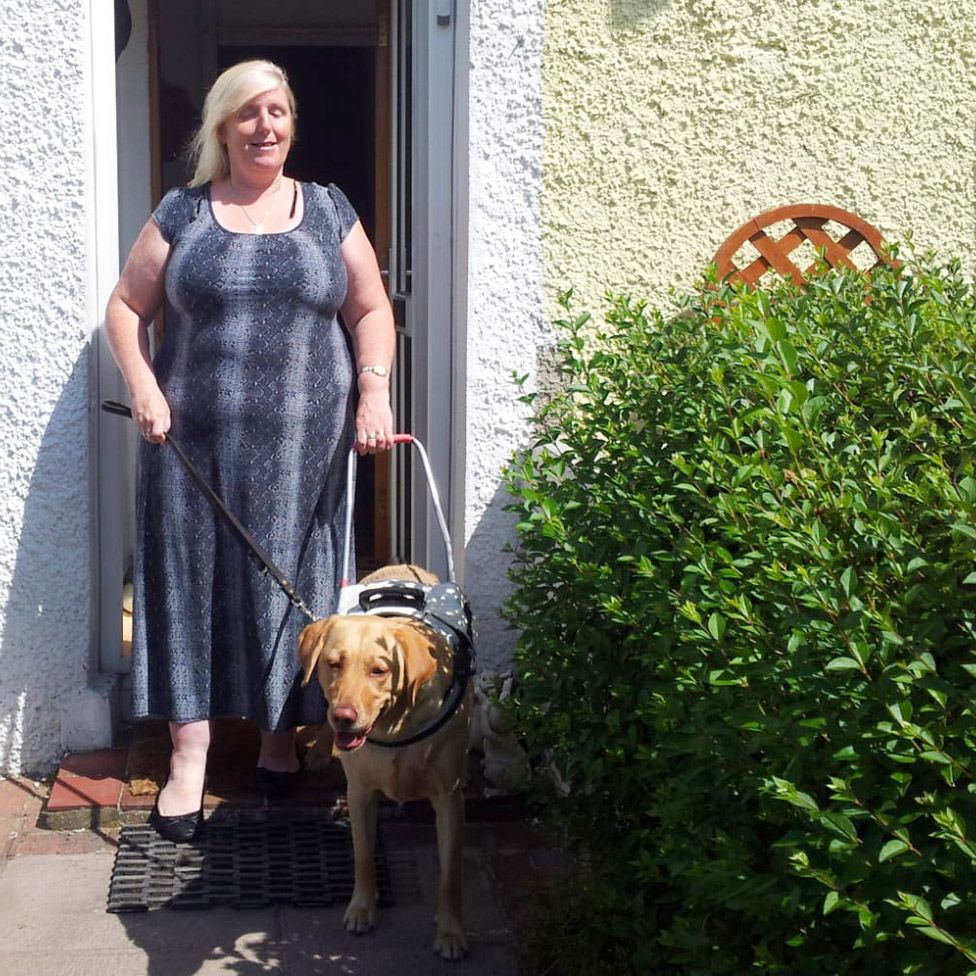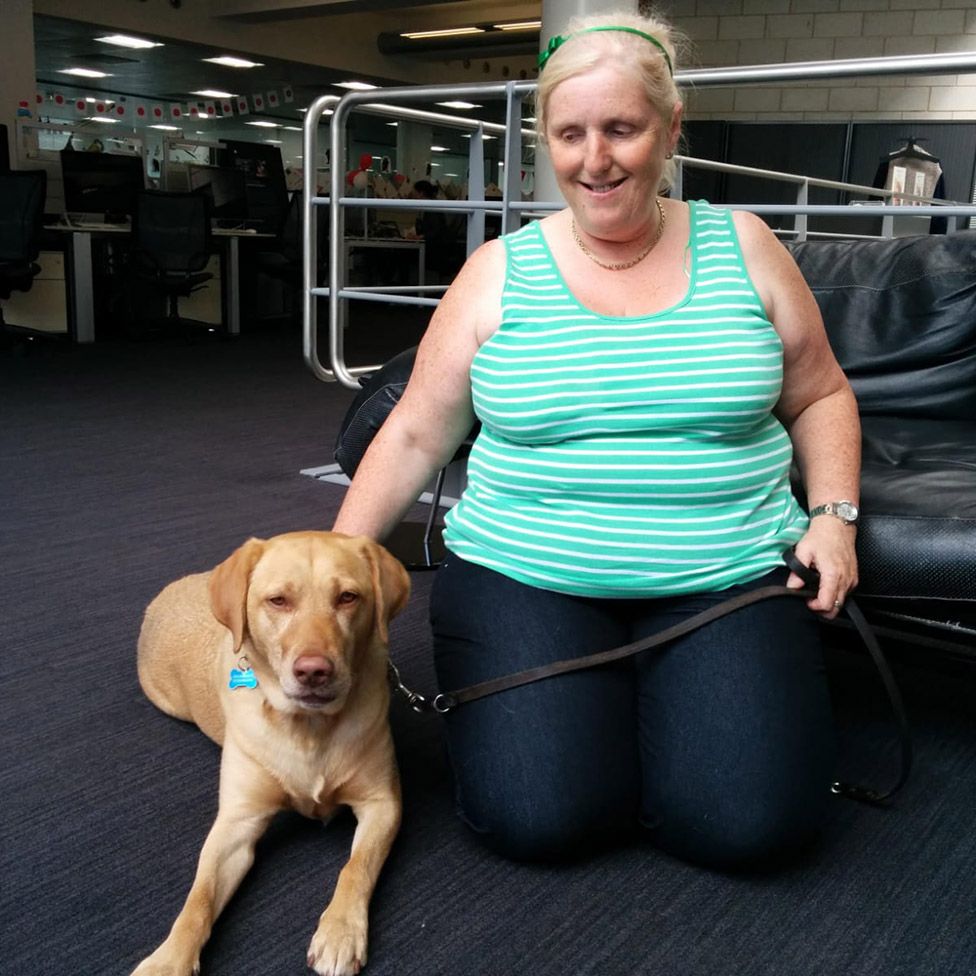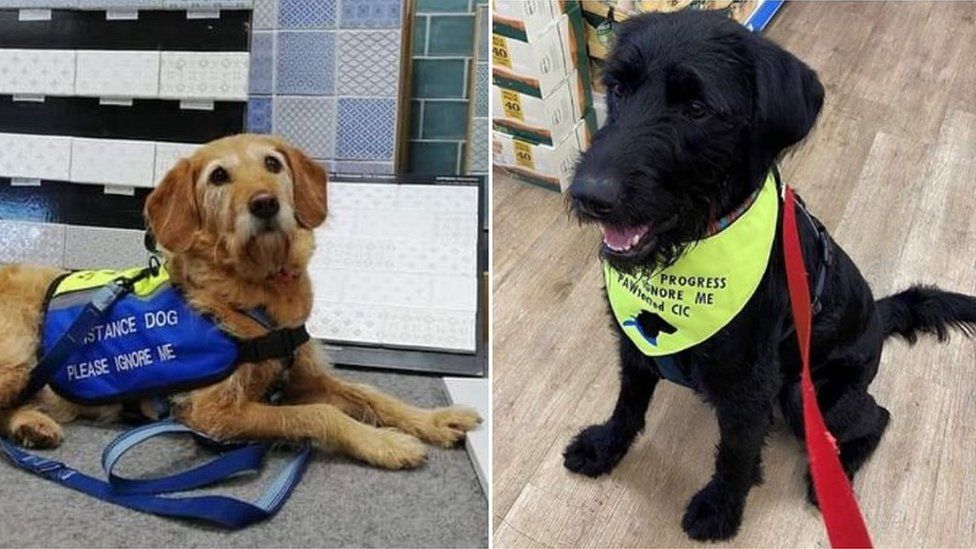
In early January a shortage of available guide dogs was reported. For some visually impaired people the wait is too long and they decide to train their own guide dogs.
Isabel Holdsworth had been making the daily commute across London from Dagenham to Kings Cross for years. Being visually impaired she had worked with five different guide dogs, until it came to a sad and abrupt end.
"My dog died suddenly and I had to go to work and college the next day - two tubes, a 40 minute walk - with no dog," she told BBC Access All.
She used her white cane instead, knowing it could be a long time before she was matched with another dog. But it wasn't easy.
"I was on Liverpool Street Station and almost fell in front of the Tube," she says. "I thought 'I can't do this anymore'."
She had an idea - could she train her own dog?
It's not a common way to go about it, but for years people have been doing this. The big question for guide dog owners is, if a dog is self-trained and not accredited by a big organisation, will they be allowed to take it to places dogs can't usually go, like restaurants, shops and in taxis? The answer is yes, the law doesn't make a distinction.
Isabel started researching the possibility of training her own dog and spoke to others who had done so.
She felt confident she could also do this and began searching rescue centres until she found Lucy, a one-year-old Labrador. Lucy hadn't had the best start in life with little socialisation and family life but Isabel felt she had found the right dog.
Having taken Lucy home, Isabel invested in a training clicker and food to reward Lucy and then booked a weeks leave from work to get started.

Abigail Hughes understands Isabel's drive to do this. She co-founded PAWtected CIC, an organisation that works with about 80 people every year to train their own assistance dogs. She says she started offering online and in-person courses when she realised dogs weren't always available for people who needed support, including autistic adults.
"You've got lesser-known dogs like allergen detection dogs, so that you don't come into contact with something you're severely allergic to," she says. "There are dogs who can help with PTSD and other traumatic circumstances."
Back in London, Isabel ventured out with Lucy. She had bought a harness and, armed with her trusty cane which she used at the same time, they started walking the street they lived on.
One of the first tasks was to teach Lucy to avoid obstacles. Isabel knew there was a lamppost on her road so she braced herself then "smacked into it and jumped back" yelping in pain.
Isabel made a huge deal about the pain hoping Lucy would take note. Then they tried the approach again.
"Lucy did a great big wide circuit around it. I didn't really have any problem with obstacles after that."
This isn't a standard way to train assistance dogs. It's usually pain-free and involves lots of repetition and positive reinforcement with treats.
Crossing roads was another essential and involved Lucy trying to learn that she mustn't always follow the commands her owner gives her because it might be dangerous - something called "intelligent disobedience". That means if Isabel instructs Lucy to cross the road but there's a car coming, Lucy must refuse.
Being a trainer who is blind, Isabel had to ensure she knew the layout of the road and where cars might appear before practising.
She says it took about four months until she had "absolute trust" in her dog. But it paid off. When Isabel hadn't heard a quiet electric car approaching, Lucy stopped Isabel from getting hit.
Isabel's aim had always been to get back to commuting with a dog and after just seven days of training she felt Lucy had learned enough to set them on their way.
But returning to the office wasn't all plain sailing.
"The first day Lucy went into the office, she pulled down the soft walls between the offices. She ate through the boss's phone cable and network cable."
Happily the company was understanding.
Isabel says it took about two years to fully train Lucy. It's a similar length of time that Guide Dogs, the UKs biggest provider of assistance dogs, takes to train its puppies before they are matched with a partner.

Guide Dogs is currently struggling to meet demand. The Covid pandemic paused breeding, training and socialising for five months. As well as fewer dogs, the number of those making it through the process dropped from 65% to less than 50% - the lowest in decades - and the average waiting time for a guide dog increased to 18 months.
The organisation said it was "devastated" by this, in its annual report. "In all our 90 years, we have never had two years as tumultuous and challenging as 2020 and 2021."
One way it is trying to mitigate this, and to diversify its gene pools, is by working with international partners. In 2022 it received dogs from America, Japan and Finland.
Tim Stafford, its director of canine affairs, says dogs bring "incredible benefits" to a person's life" but he believes guide dogs should be independently assessed rather than owner-trained to "provide clarity, reassure the public and service providers".
Although receivers of many guide dogs are used to getting dogs from a big charity, many other assistance dog charities are not so big and so the onus is on disabled people to obtain and train their own dogs.
Abigail says PAWtected CIC has helped hundreds of people and on a practical level it can be quite "simple" to start training a dog for tasks such as taking your socks off.
"You start off by playing a game of tug with the sock," she says. "Then you put the sock on your foot, leaving a tail at the end, and encourage them to play tug at the end of your foot so that they can pull it off. It builds up really slowly through fun games."
Sadly, Lucy died at the end of 2022 but for Isabel the hundreds of hours of training paid off. "Lucy was the best guide dog I ever had," she says, but adds that time and expense, such as vet bills and public liability insurance, need to be factored in before anyone attempts it.
"It's not an easy thing to do but it's not impossible for a blind person to train their own dog. It's the buzziest feeling ever."
From BBC
